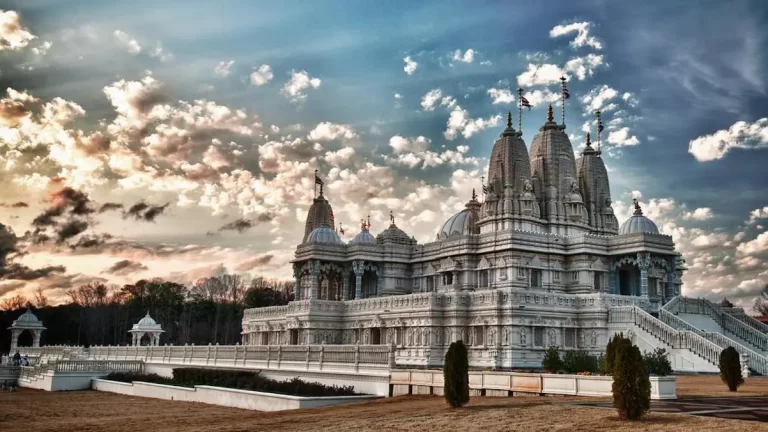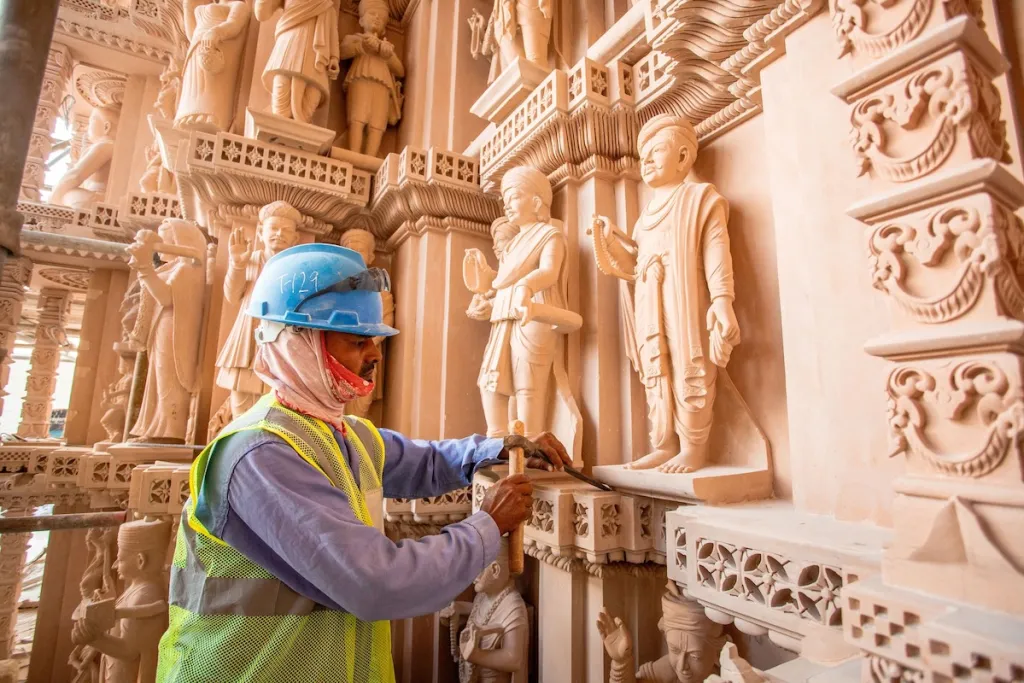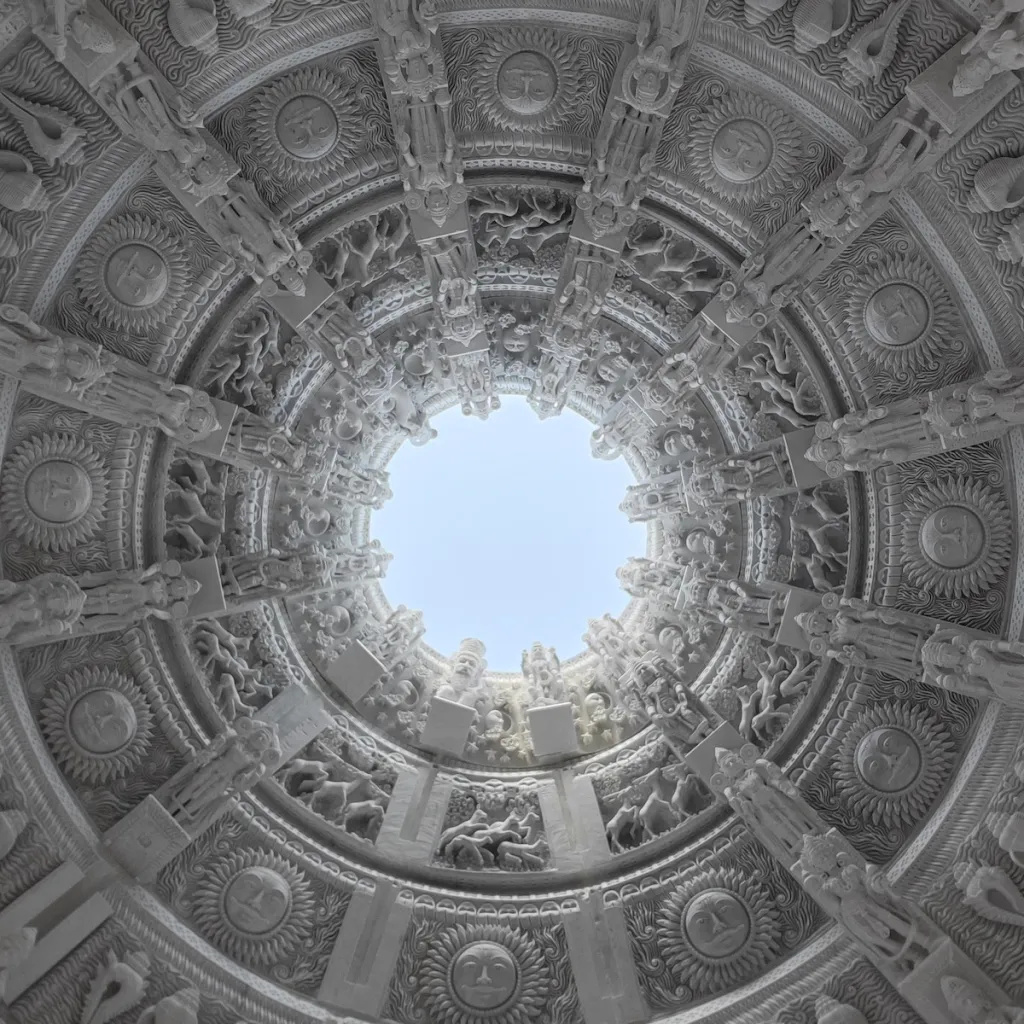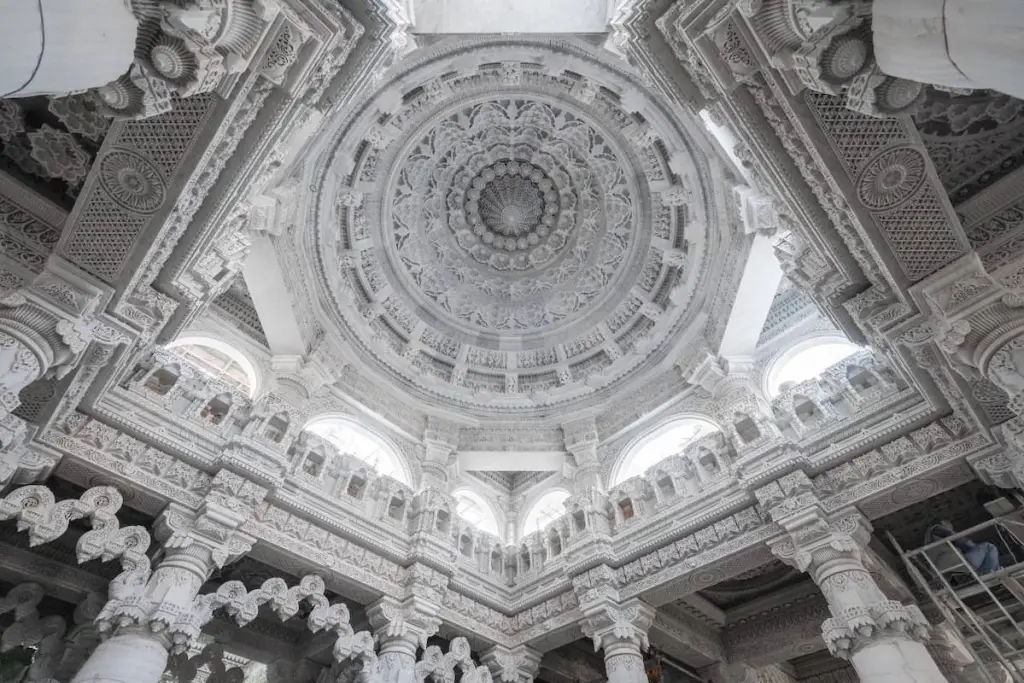
The Mandir is a symbol of interfaith harmony and cultural exchange and embodies a vision for a world where diverse communities thrive together.
Abu Dhabi
The Bochasanwasi Akshar Purushottam Swaminarayan Sanstha (BAPS) Hindu Mandir Standing tall in the shimmering sands of Abu Dhabi, was inaugurated on February 14, 2024, by Indian Prime Minister Narendra Modi. The PM was joined by His Holiness Mahant Swami Maharaj, dignitaries from UAE, and guests.
The mandir, situated in the Abu Mureikhah district, has the distinction of being the first traditional Hindu stone temple in the United Arab Emirates.
The Mandir is a testament to the commitment of the UAE government and the BAPS Swaminarayan Sanstha to interfaith harmony and cultural exchange. It embodies their shared vision for a world where diverse communities thrive together.
The temple had its roots in an idea proposed by Pramukh Swami Maharaj, the spiritual leader of BAPS in April 1997, who envisioned a mandir in Abu Dhabi that would “bring countries, cultures, communities, and religions closer together.”
Related news: Christian architect, land given by Muslim king: Abu Dhabi’s BAPS Hindu temple is an icon of communal harmony
The new BAPS temple was built on a 27-acre site on land donated by Sheikh Mohammed bin Zayed Al Nahyan, the Crown Prince of Abu Dhabi, on February 18, demonstrating the UAE’s commitment to interfaith dialogue. PM Modi launched the project at the Dubai Opera that same month, marking a historic chapter in interfaith relations.
According to a statement from BAPS North America, since the UAE’s founding in 1971, the Hindu community has formed a significant part of its multicultural tapestry. For decades, they nurtured their faith through weekly satsang assemblies, gatherings dedicated to prayer, spiritual discourses, and community building. These assemblies, strengthened by regular visits of spiritual leaders from India, provided a sense of belonging and shared purpose fueled the desire for a spiritual space that reflected their cultural heritage.

An eco-friendly mandir
The groundbreaking ceremony, the Shilanyas, held in April 2019, marked the commencement of construction which was attended by dignitaries from India and the UAE.
The mandir, built with meticulous attention to detail, incorporates sustainable practices and lowers its carbon footprint. Fly ash was substituted for some cement in the concrete mix, iron material was not used in the construction, and Nano tiles will maintain a year-round comfortable temperature for visitors. Wooden trunks and containers used to ship materials from India have been rebuilt as temple furniture.

An aesthetic blend of tradition and modernity
The mandir’s architecture blends ancient Hindu temple designs with contemporary aesthetics. It’s designed as a traditional stone Hindu temple, built in the traditional Nagara style, with seven shikhars (spires) to represent the seven Arab Emirates. Various elements used in the construction came from different parts of India – pink sandstone from Rajasthan was used for the facade, and holy water from Ganga and Yamuna was used in the consecration.
Related news: Dome of Harmony, intricate details: Features of BAPS Hindu Mandir in Abu Dhabi
Water from the Ganga flows into an amphitheater where visitors can meditate in a setting that reminds them of Varanasi. A volunteer, Vishal Patel told PTI that visitors “will see two streams of water that symbolically represent the Ganga and Yamuna rivers in India. A beam of light to represent the river Saraswati will be directed from the temple structure to form ‘Triveni’ Sangam.”
The interior, built of Italian marble, features seven shrines dedicated to deities from the North, East, West, and South of India and carved with scenes from their mythology. They include Tirupati Balaji, Ayyappan, Jagannath, Krishna and his wife Radha, Hanuman, Shiva and his wife Parvati and children Ganesh and Karthik, and Ram and his wife Sita.

Carvings that represent different cultures
A Dome of Harmony’ represents the five elements – earth, water, fire, air, and space, with carvings of horses and camels native to the UAE.
A panel on the temple’s front showcases stories of harmony from different cultures to represent universal values. Key milestones of the temple’s progress are depicted on a 3D-printed Wall of Harmony.
According to a BAPS spokesperson, “the lead architect of the BAPS Hindu Temple is a “Catholic Christian, the project manager a Sikh, the foundational designer a Buddhist, the construction company a Parsi group, and the director comes from the Jain tradition.”
Mandir Inauguration on Valentine’s Day
HH Mahant Swami Maharaj arrived in Abu Dhabi on February 5, 2024, to preside over the temple inauguration and was welcomed as a state guest by HE Sheikh Nahayan Mabarak Al Nahyan, Minister of Tolerance for the UAE. “Welcome to the UAE. Our nation is blessed with your presence. We are touched by your kindness and we feel your prayers,” he said.
The inauguration of the Mandir will be celebrated through the ‘Festival of Harmony’ – a series of programs focused on strengthening faith, mobilizing community service, and inspiring harmony among people of all generations and backgrounds. The temple opens to the public on February 18.
HH Mahant Swami Maharaj, explained, “The BAPS Hindu Mandir in Abu Dhabi serves as a spiritual oasis for global harmony that celebrates the past and recalibrates the future.”
Also read: Dilipkumar V. Lakhi – Humility Thy Second Name
_____________________